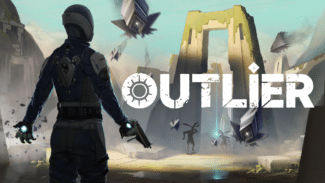I’ve noticed a pattern with Joy Way’s games.
It goes like this: we get off on the wrong foot, I think the game might just be an unmitigated disaster, then something clicks and we start over, cautiously optimistic that this could be a fruitful relationship. It happened with Stride’s active control scheme and limited amount of content, it was present with Against’s rhythm-based antics, and it struck once again with Outlier.
This is Joy Way’s take on the roguelite genre. Think Hades, Returnal, or Until You Fall, this time to the tune of an alien planet full of murderous inhabitants and an assortment of guns and superpowers to help you survive. You should know the score; tackle endless runs of a procedurally generated dungeon, gain temporary upgrades to improve your stopping power, and gather resources to purchase some permanent buffs between runs, too.
At first, Outlier leaves you wondering who exactly thought it was ready for even pre-release. Joy Way has relied heavily on early access in the past but, typically speaking, its games release with much more polish than this. The hub area is filled with placeholder textures and text, your AI companion has terribly translated dialogue and the overall presentation of the game — from muted gunshots to cookie-cutter menus — seems quite damning.
These are all things that can be easily addressed, but the issues extend into the world design. Outlier doesn’t have easily-defined arenas like other entries in the genre, and you can often see the game heaving away in the background to generate new areas. It could really cut itself some slack with a corridor or two to separate the action.
But it was the dashing mechanic that I really butted heads with. Like Stride before it, Outlier makes you jump via physical action, only instead of throwing both arms down you’ll this time use just one arm to spring into the air, following the direction of your swing. It takes a while to master this and, just as with Stride, I was at first convinced it was a clumsy and needless implementation.
But then I, y’know, got good.
Once you’re used to Outlier’s quick-footed and unusual control scheme it starts to feel pretty brilliant. One powerup lets you chain multiple dashes together, meaning you can spring into the air and then suddenly vault in a completely different direction. When you’re on the ground, enemies attack from above and below, giving the combat a panicked, any angle danger. As you can probably tell by now, Outlier doesn’t compromise when it comes to comfort. There are some vignette settings and the like but, even then, the multi-angled action and effortless mid-air dashing make even Stride look like it’s on a walking frame. Realistically, this one’s only going to be for experienced VR players.
But with that intensity comes a pretty arresting rhythm. There’s no fumbling around with reloading a pistol, for example, but you instead just flick the gun down for a second, Time Crisis-style. Bits of rubble can be plucked from the ground with telekinesis and then flung at enemies (though this mechanic has a mind of its own, often auto-aiming at the wrong targets or just failing to register the throw). Later on, gems unlock powers that mix up the gameplay too, like the ability to throw fire. When you’re keeping pace with it, Outlier is a genuinely superheroic shooter.
A run through the dungeon can be so much fun you’ll even find yourself generously overlooking some of the game’s more inherent issues. Along with the technical shortcomings, enemy AI is a bit of a scramble, with certain types unable to make up their minds on which direction they should move in. The wide-open areas also mean it’s difficult for the player to tell if they’re meant to be standing their ground and fighting to the last bullet or if they should just dash through an area ignoring enemies. At times enemies swarm in droves — at which point I’d noticed some big performance drops — and it’s never clear if there’s a set number of them spawning or the game’s trying to usher you along with overwhelming odds.
At launch, then, Outlier isn’t quite the home run that Against was. Though there’s certainly the potential for a thrilling VR roguelite here, there’s a fair few rough edges and structural problems that need to be ironed out throughout early access before we could really say it was worth a look. More cautious optimism, then, but with this marking the fourth major early access release for Joy Way with a full game yet to launch, it’s high past time the developer started consolidating on some of this potential.
Outlier launches on Steam via early access tomorrow, with a Quest release planned for later in the year.






